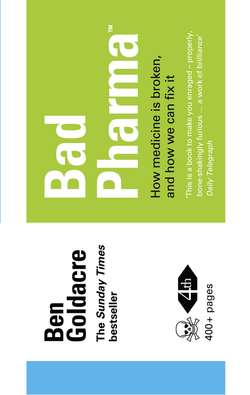Читать книгу Bad Pharma: How Medicine is Broken, And How We Can Fix It - Ben Goldacre - Страница 15
What can be done?
ОглавлениеThere are several simple solutions to these problems, which fall into three categories. There is no argument against any of the following suggestions that I am aware of. The issue of missing data has been neglected through institutional inertia, and reluctance by senior academics to challenge industry. Their failure to act harms patients every day.
Gagging clauses
If there is nothing to be ashamed of in gagging clauses – if companies, and legislators, and academics, and university contracts departments, all believe that they are acceptable – then everything should be out in the open, prominently flagged up, so that everyone outside those systems can decide if they agree.
1 Until they can be eradicated, where gagging clauses exist, patients should be told, at the time they are invited to participate in a trial, that the company sponsoring it is allowed to hide the results if it doesn’t like them. The consent form should also explain clearly that withholding negative results will lead to doctors and patients being misled about the effectiveness of the treatment being trialled, and so exposed to unnecessary harm. Trial participants can then decide for themselves if they think these contracts are acceptable.
2 Wherever the sponsoring company has the contractual right to gag publication, even if it doesn’t exercise that right, the fact that a gagging clause existed should be stated clearly: in the academic paper; in the trial protocol; and in the publicly available trial registry entry that goes up before the trial starts. Readers of the trial findings can then decide for themselves if they trust that sponsor and research group to publish all negative findings, and interpret any reported positive findings in that light.
3 All university contracts should follow the same boilerplate format, and forbid gagging clauses. Failing that, all universities should be forced to prominently declare which contracts with gagging clauses they have permitted, and to publish those clauses online for all to see, so that all can be alerted that the institution is producing systematically biased research, and discount any findings from them accordingly.
4 In legislation, gagging clauses should be made illegal, with no possibility of quibbles. If there is a dispute about analysis or interpretation between the people running the trial and the people paying for it, it should take place in the published academic literature, or some other public forum. Not in secret.
Professional bodies
1 All professional bodies should take a clear stand on unpublished trial data, declare it clearly as research misconduct, and state that it will be handled like any other form of serious misconduct that misleads doctors and harms patients. That they have not done so is a stain on the reputation of these organisations, and on their senior members.
2 All research staff involved in any trial on humans should be regarded as jointly and severally liable for ensuring that it is published in full within one year of completion.
3 All those responsible for withholding trial data should have their names prominently posted in a single database, so that others can be made aware of the risk of working with them, or allowing them access to patients for research, in future.
Ethics committees
1 No person should be allowed to conduct trials in humans if a research project they are responsible for is currently withholding trial data from publication more than one year after completion. Where any researcher on a project has a previous track record of delayed publication of trial data, the ethics committee should be notified, and this should be taken into account, as with any researcher guilty of research misconduct.
2 No trial should be approved without a firm guarantee of publication within one year of completion.
